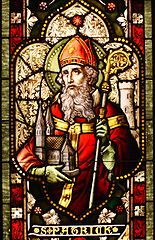
The Life And Writings Of Saint Patrick -Saint Patrick
III.—PATRICK’S PRIEST
The next official mentioned is Mochta, ‘his priest.’ This was the Abbot of Louth, and one of the oldest and dearest disciples of St. Patrick. He was, like Patrick himself, a Briton, who, it is said, came to Ireland in his youth, landing, probably, at Carlingford or Dundalk. Going inland, he founded a monastery in the woods of Hy Meith, before he came to Louth. His functions in relation to St. Patrick were, probably, as Colgan thinks, those of arch-priest in the Western Church at the time. This official was originally the senior priest of the diocese by ordination, but afterwards became a dignitary ‘whose functions correspond to those of vicar-general in the city, or rural dean in the country districts.’ It was also his privilege to assist the bishop both at the throne and altar in the more solemn episcopal functions. He was, in fact, the first dignitary of the diocese after the bishop.
The holy and venerable Mochta was, from every point of view, entitled to be arch-priest to St. Patrick. He was, probably, by ordination, amongst the oldest of the disciples of Patrick. He was, also, his countryman and intimate personal friend, remarkable, too, for great learning and great holiness, and thus in every sense worthy of the high honour of being the priest to St. Patrick. It is said, also, that he was the last survivor of the personal disciples of our great Apostle, and lived on to the year A.D. 535, when he must have been as old as Saint Patrick himself was at the time of his own death. Louth is not more than twenty miles from Armagh, and is still a parish of the Primate’s diocese, so that Patrick and his priest might frequently meet without inconvenience at the most solemn functions of the Church. His office as arch-priest goes to show that Mochta was simply a presbyter abbot, like the great St. Columba, and, doubtless through humility, never accepted the higher grade of bishop. It is not improbable that he was also confessor, or soul’s friend, to St. Patrick.

 Keep Site Running
Keep Site Running